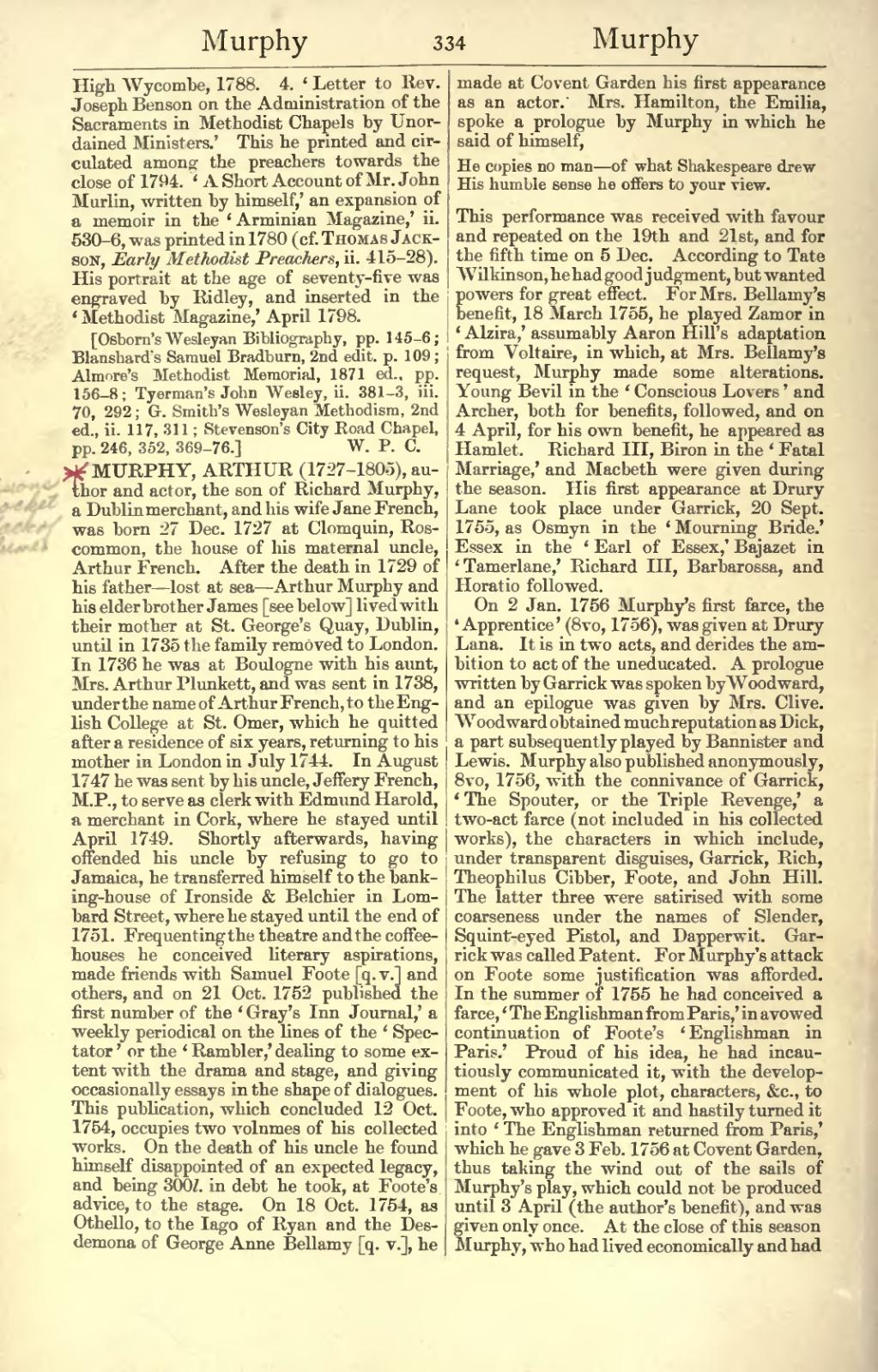- 'Letter to Rev. Joseph Benson on the Administration of the Sacraments in Methodist Chapels by Unordained Ministers.' This he printed and circulated among the preachers towards the close of 1794. 'A Short Account of Mr. John Murlin, written by himself,' an expansion of a memoir in the 'Arminian Magazine,' ii. 530-6, was printed in 1780 (cf. Thomas Jackson, Early Methodist Preachers, ii. 415-28). His portrait at the age of seventy-five was engraved by Ridley, and inserted in the 'Methodist Magazine,' April 1798.
High Wycombe, 1788.
[Osborn's Wesleyan Bibliography, pp. 145–6; Blanshard's Samuel Bradburn, 2nd edit. p. 109; Almore's Methodist Memorial, 1871 ed., pp. 156–8; Tyerman's John Wesley, ii. 381–3, iii. 70, 292; G. Smith's Wesleyan Methodism, 2nd ed., ii. 117, 311; Stevenson's City Road Chapel, pp. 246, 352, 369–76.]
MURPHY, ARTHUR (1727–1805), author and actor, the son of Richard Murphy, a Dublin merchant, and his wife Jane French, was born 27 Dec. 1727 at Clomquin, Roscommon, the house of his maternal uncle, Arthur French. After the death in 1729 of his father lost at sea Arthur Murphy and his elder brother James [see below] lived with their mother at St. George's Quay, Dublin, until in 1735 the family removed to London. In 1736 he was at Boulogne with his aunt, Mrs. Arthur Plunkett, and was sent in 1738, under the name of Arthur French, to the English College at St. Omer, which he quitted after a residence of six years, returning to his mother in London in July 1744. In August 1747 he was sent by his uncle, Jeffery French, M.P., to serve as clerk with Edmund Harold, a merchant in Cork, where he stayed until April 1749. Shortly afterwards, having offended his uncle by refusing to go to Jamaica, he transferred himself to the banking-house of Ironside & Belchier in Lombard Street, where he stayed until the end of 1751. Frequenting the theatre and the coffee-houses he conceived literary aspirations, made friends with Samuel Foote [q. v.] and others, and on 21 Oct. 1752 published the first number of the 'Gray's Inn Journal,' a weekly periodical on the lines of the 'Spectator' or the 'Rambler,' dealing to some extent with the drama and stage, and giving occasionally essays in the shape of dialogues. This publication, which concluded 12 Oct. 1754, occupies two volumes of his collected works. On the death of his uncle he found himself disappointed of an expected legacy, and being 300l. in debt he took, at Foote's advice, to the stage. On 18 Oct. 1754, as Othello, to the Iago of Ryan and the Desdemona of George Anne Bellamy [q. v.], he made at Covent Garden his first appearance as an actor.' Mrs. Hamilton, the Emilia, spoke a prologue by Murphy in which he said of himself,
He copies no man—of what Shakespeare drew
His humble sense he offers to your view.
This performance was received with favour and repeated on the 19th and 21st, and for the fifth time on 5 Dec. According to Tate Wilkinson, he had good judgment, but wanted powers for great effect. For Mrs. Bellamy's benefit, 18 March 1755, he played Zamor in 'Alzira,' assumably Aaron Hill's adaptation from Voltaire, in which, at Mrs. Bellamy's request, Murphy made some alterations. Young Bevil in the 'Conscious Lovers ' and Archer, both for benefits, followed, and on 4 April, for his own benefit, he appeared as Hamlet. Richard III, Biron in the 'Fatal Marriage,' and Macbeth were given during the season. His first appearance at Drury Lane took place under Garrick, 20 Sept. 1755, as Osmyn in the 'Mourning Bride.' Essex in the 'Earl of Essex,' Bajazet in 'Tamerlane,' Richard III, Barbarossa, and Horatio followed.
On 2 Jan. 1756 Murphy's first farce, the 'Apprentice' (8vo, 1756), was given at Drury Lana. It is in two acts, and derides the ambition to act of the uneducated. A prologue written by Garrick was spoken by Woodward, and an epilogue was given by Mrs. Clive. Woodward obtained much reputation as Dick, a part subsequently played by Bannister and Lewis. Murphy also published anonymously, 8vo, 1756, with the connivance of Garrick, 'The Spouter, or the Triple Revenge,' a two-act farce (not included in his collected works), the characters in which include, under transparent disguises, Garrick, Rich, Theophilus Gibber, Foote, and John Hill. The latter three were satirised with some coarseness under the names of Slender, Squint-eyed Pistol, and Dapperwit. Garrick was called Patent. For Murphy's attack on Foote some justification was afforded. In the summer of 1755 he had conceived a farce, 'The Englishman from Paris,' in avowed continuation of Foote's 'Englishman in Paris,' Proud of his idea, he had incautiously communicated it, with the development of his whole plot, characters, &c., to Foote, who approved it and hastily turned it into 'The Englishman returned from Paris,' which he gave 3 Feb. 1756 at Covent Garden, thus taking the wind out of the sails of Murphy's play, which could not be produced until 3 April (the author's benefit), and was given only once. At the close of this season Murphy, who had lived economically and had
